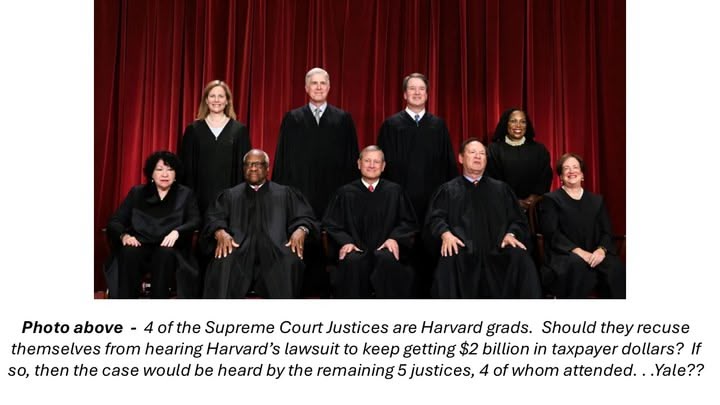America’s richest university sues US government to keep taxpayer money coming
Okay – “the richest” university would be Harvard, in case anyone needed help with this low-level Jeopardy question. Harvard is terrified that the government might reduce or cut off their taxpayer funded welfare. That would be a threat to $2.2 billion immediately, and around $9 billion in total. See link below.
Harvard has an endowment of $53 billion. Endowments are kind of like an IRA. Special tax rules, and your bank account keeps growing, year after year. Harvard is richer than Rupert Murdoch and Melissa French Gates – combined. You’d be outraged if Rupert Murdoch was getting billion dollar checks from the US government, wouldn’t you?
Here’s Harvard’s specific complaint: they refuse appoint an independent advisor to help ensure their classes and course material are “diverse”. Diverse is in quotes because it’s Harvard’s SPECIFIC objection. Harvard is now apparently against DEI. Last year they were for it. I guess the wrong kind of diversity must be resisted at all costs. It could be an existential threat to a university.
This case, of course, is probably going to end up in the US Supreme Court. Where four of the Justices graduated from Harvard Law School: Ketanji Brown Jackson, Gorsuch, Elena Kagan, and Chief Justice Roberts. Another 4 justices graduated from Yale, Harvard’s historic rival. This case could be better than the annual Harvard-Yale football game. (Harvard usually wins that. A rivalry that's been happening since 1875 - 150 years).
Harvard’s attorneys and administrators have another complaint: “Government should not dictate what universities teach”. Yeah, tell that to the politicians who are screaming bloody murder about the impending death of the US Department of Education. The DOE's sole mission was to dictate public school curriculums.
Of course, the Trump administration has a different story: this is about the recent pro-Hamas/antisemitic protests on campus. Replete with vandalism, arson, interruption of classes, cancellation of exams, and intimidation of students suspected of being Jewish. Well, I can see how protecting the rights of a religious minority and ending violent protests would sound alarm bells to a college sitting on a $53 billion bank account.
This wouldn't be the first time Harvard was on the wrong side of history. Until the state of Massachusetts outlawed slavery in the 18th century, Harvard faculty and staff owned dozens of slaves.
I'm just sayin' . . .
First Thing: Harvard sues Trump administration over grants freeze
Harvard University endowment - Wikipedia







